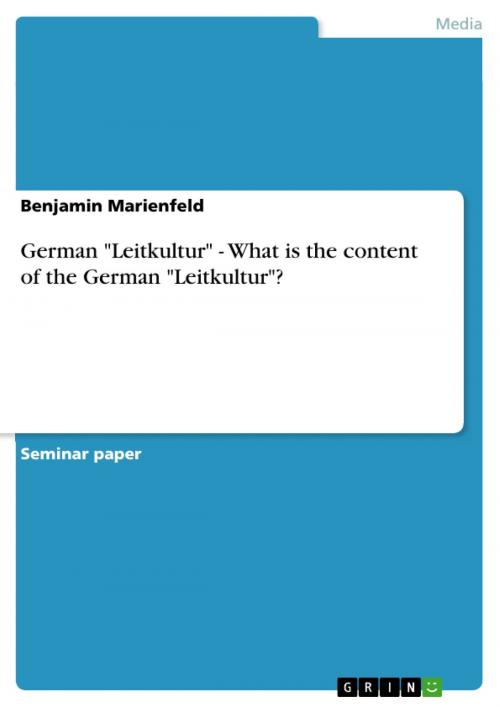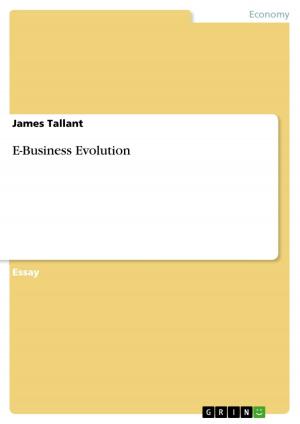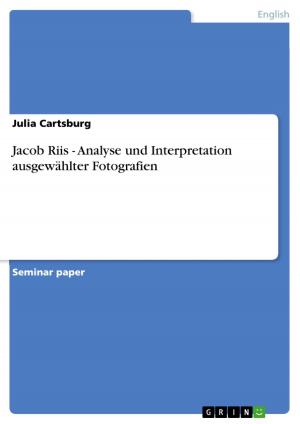German 'Leitkultur' - What is the content of the German 'Leitkultur'?
What is the content of the German 'Leitkultur'?
Nonfiction, Reference & Language, Language Arts, Communication| Author: | Benjamin Marienfeld | ISBN: | 9783640400997 |
| Publisher: | GRIN Publishing | Publication: | August 17, 2009 |
| Imprint: | GRIN Publishing | Language: | English |
| Author: | Benjamin Marienfeld |
| ISBN: | 9783640400997 |
| Publisher: | GRIN Publishing |
| Publication: | August 17, 2009 |
| Imprint: | GRIN Publishing |
| Language: | English |
Seminar paper from the year 2008 in the subject Communications - Intercultural Communication, grade: 1,0, European University Viadrina Frankfurt (Oder), language: English, abstract: What is German culture? The loads of books, papers, articles, documentaries, etc. that are concerned with this topic, suggest the conclusion that it is not possible, to give a satisfactory and sufficient answer to this short and plain question, since the answer is too complex. The term German is a very complex one, and even more the term culture. Notwithstanding I will try to approach the question about the German culture in this paper. To circumscribe the topic I will limit the question to German Leitkultur. What German Leitkultur can be, will hopefully become clear in the course of this paper. Initially I describe it as the components of the German culture that should be obligatory to every member of the nation and are therefore the most significant parts in the web of culture. One first possible approach to the culture of the German nation which is instructive is the examination of the text of the national anthem, because the national anthem gives us information about what is significant in a society called nation. The text of the German hymn begins with the words: 'Einigkeit und Recht und Freiheit' (unity/agreement and law/justice and freedom). The words Einigkeit und Freiheit exclude and contradict each other in several contexts. Einigkeit implies a consent of opinions and values of a group or society, in this case the German nation. The Einigkeit is legitimised in a common belief, which I will explain later, and executed by the Recht. There is for example Einigkeit on the fact that murder is a crime by which punishment is legitimised and carried through by the Recht. Even if the Einigkeit is artificial, just like the nation itself is an 'artificial construct', it is in force. To keep it in force, Leitkultur is needed. Freiheit is a part of the German Einigkeit. In contrast to the obligations of Einigkeit it emphasises the individual possibilities that everyone in the nation has. Religious membership for example is free to choose for every member of the nation as well as a multitude of other aspects. It can be said that the value of freedom in democratic societies like that in Germany is more substantial than in most historical societies or contemporary political systems (like socialism e.g.). From the partly contradicting terms in the national anthem it can be concluded that there are components in the culture of the German nation that are obligatory and components that are optional. [...]
Seminar paper from the year 2008 in the subject Communications - Intercultural Communication, grade: 1,0, European University Viadrina Frankfurt (Oder), language: English, abstract: What is German culture? The loads of books, papers, articles, documentaries, etc. that are concerned with this topic, suggest the conclusion that it is not possible, to give a satisfactory and sufficient answer to this short and plain question, since the answer is too complex. The term German is a very complex one, and even more the term culture. Notwithstanding I will try to approach the question about the German culture in this paper. To circumscribe the topic I will limit the question to German Leitkultur. What German Leitkultur can be, will hopefully become clear in the course of this paper. Initially I describe it as the components of the German culture that should be obligatory to every member of the nation and are therefore the most significant parts in the web of culture. One first possible approach to the culture of the German nation which is instructive is the examination of the text of the national anthem, because the national anthem gives us information about what is significant in a society called nation. The text of the German hymn begins with the words: 'Einigkeit und Recht und Freiheit' (unity/agreement and law/justice and freedom). The words Einigkeit und Freiheit exclude and contradict each other in several contexts. Einigkeit implies a consent of opinions and values of a group or society, in this case the German nation. The Einigkeit is legitimised in a common belief, which I will explain later, and executed by the Recht. There is for example Einigkeit on the fact that murder is a crime by which punishment is legitimised and carried through by the Recht. Even if the Einigkeit is artificial, just like the nation itself is an 'artificial construct', it is in force. To keep it in force, Leitkultur is needed. Freiheit is a part of the German Einigkeit. In contrast to the obligations of Einigkeit it emphasises the individual possibilities that everyone in the nation has. Religious membership for example is free to choose for every member of the nation as well as a multitude of other aspects. It can be said that the value of freedom in democratic societies like that in Germany is more substantial than in most historical societies or contemporary political systems (like socialism e.g.). From the partly contradicting terms in the national anthem it can be concluded that there are components in the culture of the German nation that are obligatory and components that are optional. [...]















